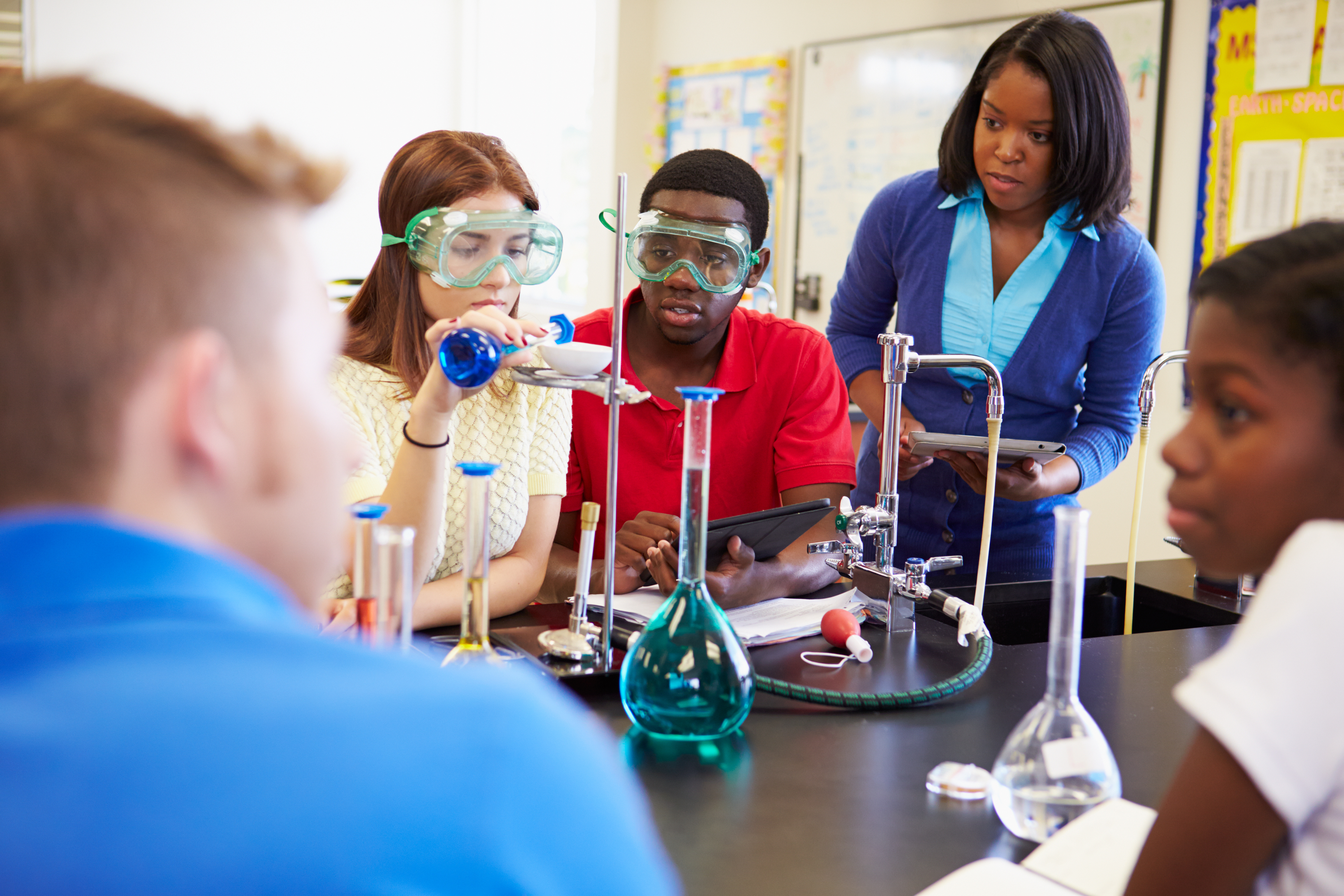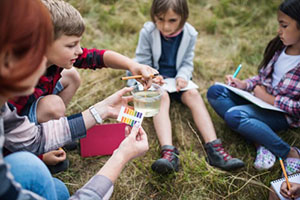Science
Scientific and technological advances have proliferated and now permeate most aspects of life in the 21st century. It is increasingly important that all members of our society develop an understanding of scientific and engineering concepts and processes. Learning how to construct scientific explanations and how to design evidence-based solutions provides students with tools to think critically about personal and societal issues and needs. Students can then contribute meaningfully to decision-making processes, such as discussions about climate change, new approaches to health care, and innovative solutions to local and global problems.
2020 New Jersey Student Learning Standards for Science
Intent and Spirit
The New Jersey Student Learning Standards for Science (NJSLS-S) describe the expectations for what students should know and be able to do as well as promote three-dimensional science instruction across the three science domains (i.e., physical sciences, life science, Earth and space sciences). From the earliest grades, the expectation is that students will engage in learning experiences that enable them to investigate phenomena, design solutions to problems, make sense of evidence to construct arguments, and critique and discuss those arguments (in appropriate ways relative to their grade level).
The foundation of the NJSLS-S reflects three dimensions — science and engineering practices, disciplinary core ideas, and crosscutting concepts. The performance expectations are derived from the interplay of these three dimensions. It is essential that these three components are integrated into all learning experiences. Within each standard document, the three dimensions are intentionally presented as integrated components to foster sensemaking and designing solutions to problems. Because the NJSLS-S is built on the notions of coherence and contextuality, each of the science and engineering practices and crosscutting concepts appear multiple times across topics and at every grade level. Additionally, the three dimensions should be an integral part of every curriculum unit and should not be taught in isolation.
Mission
All students will possess an understanding of scientific concepts and processes required for personal decision-making, participation in civic life, and preparation for careers in STEM fields (for those that chose).
Vision
Prepare students to become scientifically literate individuals who can effectively:
- Apply scientific thinking, skills, and understanding to real-world phenomena and problems;
- Engage in systems thinking and modeling to explain phenomena and to give a context for the ideas to be learned;
- Conduct investigations, solve problems, and engage in discussions;
- Discuss open-ended questions that focus on the strength of the evidence used to generate claims;
- Read and evaluate multiple sources, including science-related magazine and journal articles and web-based resources to gain knowledge about current and past science problems and solutions and develop well-reasoned claims; and
- Communicate ideas through journal articles, reports, posters, and media presentations that explain and argue.
The performance expectations reflect the three dimensions and describe what students should know and be able to do. In layman’s terms, they are “the standards.” They are written as statements that can be used to guide assessment and allow for flexibility in the way that students are able to demonstrate proficiency. The example below is provided to illustrate the interconnected nature of the NJSLS-S components.
Disciplinary Core Ideas and Performance Expectations
Disciplinary Core Idea
Patterns of the apparent motion of the sun, the moon, and stars in the sky can be observed, described, predicted, and explained with models.
Performance Expectation
Develop and use a model of the Earth-sun-moon system to describe the cyclic patterns of lunar phases, eclipses of the sun and moon, and seasons.
Science and Engineering Practices
Developing and Using Models
Develop and use a model to describe phenomena.
Crosscutting Concepts
Scale, Proportion, and Quantity
Time, space, and energy phenomena can be observed at various scales using models to study systems that are too large or too small.
Becoming familiar with the science practices and crosscutting concepts is a critically important first step in designing learning experiences reflective of the three dimensions. A description of each of the science and engineering practices and the cross-cutting concepts can be found in the next sections.
Further, for students to develop proficiency of the NJSLS-S, they will need to engage in learning experiences that are meaningful, cumulative and progressive. Learning experiences designed to be meaningful, go beyond reading about science concepts and provide opportunities for students to be active learners and make sense of ideas. Cumulative learning experiences provide opportunities for students to use and build on ideas that they have learned in previous units. Progressive learning experiences provide multiple occasions for students to engage in ways that enable them to improve their construction of explanations and solutions over time by iteratively assessing them, elaborating on them, and holding them up to critique and evidence.
Asking Questions and Defining Problems
A practice of science is to ask and refine questions that lead to descriptions and explanations of how the natural and designed world works and which can be empirically tested.
Engineering questions clarify problems to determine criteria for successful solutions and identify constraints to solve problems about the designed world. Both scientists and engineers also ask questions to clarify the ideas of others.
Planning and Carrying Out
Investigations Scientists and engineers plan and carry out investigations in the field or laboratory, working collaboratively as well as individually. Their investigations are systematic and require clarifying what counts as data and identifying variables or parameters.
Engineering investigations identify the effectiveness, efficiency, and durability of designs under different conditions.
Analyzing and Interpreting Data
Scientific investigations produce data that must be analyzed in order to derive meaning. Because data patterns and trends are not always obvious, scientists use a range of tools—including tabulation, graphical interpretation, visualization, and statistical analysis—to identify the significant features and patterns in the data. Scientists identify sources of error in the investigations and calculate the degree of certainty in the results. Modern technology makes the collection of large data sets much easier, providing secondary sources for analysis.
Engineering investigations include analysis of data collected in the tests of designs. This allows comparison of different solutions and determines how well each meets specific design criteria—that is, which design best solves the problem within given constraints. Like scientists, engineers require a range of tools to identify patterns within data and interpret the results. Advances in science make analysis of proposed solutions more efficient and effective.
Developing and Using Models
A practice of both science and engineering is to use and construct models as helpful tools for representing ideas and explanations. These tools include diagrams, drawings, physical replicas, mathematical representations, analogies, and computer simulations.
Modeling tools are used to develop questions, predictions and explanations; analyze and identify flaws in systems; and communicate ideas. Models are used to build and revise scientific explanations and proposed engineered systems. Measurements and observations are used to revise models and designs.
Constructing Explanations and Designing Solutions
The products of science are explanations and the products of engineering are solutions.
The goal of science is the construction of theories that provide explanatory accounts of the world. A theory becomes accepted when it has multiple lines of empirical evidence and greater explanatory power of phenomena than previous theories.
The goal of engineering design is to find a systematic solution to problems that is based on scientific knowledge and models of the material world. Each proposed solution results from a process of balancing competing criteria of desired functions, technical feasibility, cost, safety, aesthetics, and compliance with legal requirements. The optimal choice depends on how well the proposed solutions meet criteria and constraints.
Engaging in Argument from Evidence
Argumentation is the process by which explanations and solutions are reached.
In science and engineering, reasoning and argument based on evidence are essential to identifying the best explanation for a natural phenomenon or the best solution to a design problem. Scientists and engineers use argumentation to listen to, compare, and evaluate competing ideas and methods based on merits.
Scientists and engineers engage in argumentation when investigating a phenomenon, testing a design solution, resolving questions about measurements, building data models, and using evidence to identify strengths and weaknesses of claims.
Using Mathematics and Computational Thinking
In both science and engineering, mathematics and computation are fundamental tools for representing physical variables and their relationships. They are used for a range of tasks such as constructing simulations; statistically analyzing data; and recognizing, expressing, and applying quantitative relationships.
Mathematical and computational approaches enable scientists and engineers to predict the behavior of systems and test the validity of such predictions. Statistical methods are frequently used to identify significant patterns and establish correlational relationships.
Obtaining, Evaluating, and Communicating Information
Scientists and engineers must be able to communicate clearly and persuasively the ideas and methods they generate.
Critiquing and communicating ideas individually and in groups is a critical professional activity.
Communicating information and ideas can be done in multiple ways: using tables, diagrams, graphs, models, and equations as well as orally, in writing, and through extended discussions. Scientists and engineers employ multiple sources to acquire information that is used to evaluate the merit and validity of claims, methods, and design.
Professional Learning about Classroom-Based Assessment
- Short Course: How to Develop Three-Dimensional Formative Assessments for the Science Classroom
- Developing Assessments for the NGSS: Classroom Assessment
- The Stanford NGSS Assessment Project (SNAP)
Tools for Developing Local 3-D Assessments
- Integrating Science Practices into Assessment Tasks
- Prompts for Integrating Crosscutting Concepts into Assessment and Instruction
- Assessment Development Template
- Science Assessment Task Screening Tools
- NextGenScience Resources for Implementing Three-Dimensional Science Assessments
Examples of High-Quality Science Assessments
Dissection Law
N.J.S.A. 18A:35-4.24 and N.J.S.A. 18A:35-4.25 authorizes parents or guardians to assert the right of their children to refuse to dissect, vivisect, incubate, capture or otherwise harm or destroy animals or any parts thereof as part of a course of instruction.
Office of Standards
 Official Site of The State of New Jersey
Official Site of The State of New Jersey


